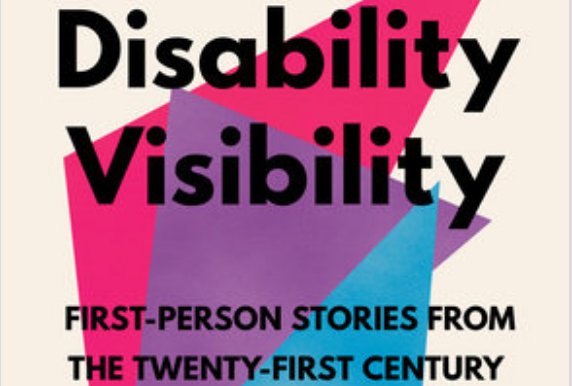
“There are not enough self-identified Deaf, chronically ill, and neurodiverse people in publishing,” Alice Wong, editor of Disability Visibility: First Person Stories from the Twenty-First Century, writes in an introduction to the book. “This directly impacts what gets published, who gets published, and industry assumptions of what disabled and non-disabled readers are hungry for.”
Disability Visibility, a compilation of thirty-seven personal essays by writers of diverse races, classes, ethnicities, sexualities, and job titles, hopes to help reverse this.
“These stories,” Wong writes, “do not seek to explain the meaning of disability or elicit empathy. Rather, they show disabled people simply being in our own words, by our own accounts. . . .. Disability is pain, struggle, brilliance, abundance, and joy.”
Every piece in Disability Visibility evokes a similar tenacity, some gut-wrenching and others inspiring.
In addition to these emotions the essays in Disability Visibility convey the frustration that, thirty years after passage of the Americans with Disabilities Act, disability justice remains elusive.
One of the most moving pieces is by the late Harriet McBryde Johnson. Johnson traveled from her home in Charleston, South Carolina, to New Jersey’s Princeton University to debate philosopher Peter Singer about the efficacy of infanticide and assisted suicide.
“He is the man who wants me dead,” she writes in “Unspeakable Conversations.” “He wants to legalize the killing of certain babies who might come to be like me if allowed to live.”
Johnson’s makes clear that having a disability does not have to mean a diminished life. She was, after all, an attorney, with many beloved friends, colleagues, and family members. And, while she needed a great deal of assistance with everyday tasks, her essay emphasizes that neither she nor any other disabled person are disposable. As she sees it, Singer is advocating genocide.
“In his mind,” she writes, “he’s only giving parents a choice. He thinks the humans he is talking about aren’t people.”
Rebecca Cokley’s “The Antiabortion Bill You Aren’t Hearing About” steps back from both assisted suicide and infanticide to address anti-abortion legislation that typically allows terminations for “fetal abnormalities.”
Cokley supports reproductive choice, but acknowledges that this is thorny terrain.
“It’s hard to be a pro-choice disabled person who understands that believing in bodily autonomy means you have to support the idea that other people—your friends, your peers, your siblings—may choose to abort a pregnancy because their child can be like you,” she writes. “Those on the pro-choice side often use disability as a monster under the bed, framing our lives as lacking dignity, independence, or value. Our lives are valuable because they’re our lives. Why is that not enough?”
Another essay, “The Isolation of Being Deaf in Prison,” is a heartrending chronicle of Jeremy Woody’s incarceration told to Christine Thompson. Woody was held in a Georgia state prison from 2013 to 2017. At the time, he recalls, no one in the prison knew American Sign Language, “not the doctors or the nurses, the mental health department, the administration, the chaplain, the mailroom. Nobody.”
As someone with limited English literacy skills, Woody describes his profound isolation. He also tells Thompson about a disciplinary hearing in which his hands were shackled behind his back, giving him no way to communicate.
“All I saw were lips moving. I saw laughter,” he recalls. “I wanted to ask for an interpreter. But I couldn’t. They said, ‘Okay, you have nothing to say? Guilty.’ This infuriated me. I started to scream. That was really all I could do. They sent me to the hole and I cried endlessly. It’s hard to describe the fury and anger.”
But as grim as this and other accounts are, Disability Visibility also shows that joy, camaraderie, humor, and abundant mutual aid are also part of the disabled experience.
Leah Lakshmi Piepzna-Samarasinha champions solidarity in “Still Dreaming Wild Disability Justice Dreams at the End of the World.”
The essay describes new collectives popping up throughout North America, including Disability Justice Network of Ontario, Detroit Disability Power, Fat Roses, and more, marking “a new generation of disability justice activism.”
Her goal? Taking over Centers for Independent Living and Disability Studies programs to create a more interdependent model.
Piepzna-Samarasinha calls this a “disability justice dream.” But she’s determined to make it a reality. “We have what we always have had and more,” she concludes. “We know how to crip innovate/to do some shit that no one says is possible/to do something wild and unexpected under the radar/to keep going.”
Every piece in Disability Visibility evokes a similar tenacity, some gut-wrenching and others inspiring. While I wish more elders were included, the range of subjects is impressive: assistive technologies, carceral injustice, fashion, homophobia and heterosexism, medical care and medical abuse, organizing strategies, psychotherapy, racism, relationships, sex, and sexism.
The collection also zeroes in on personal vulnerabilities and personal fortitude.
While intended for both disabled and non-disabled readers, Disability Visibility stresses that non-disabled people have a lot to learn from their disabled friends and neighbors.
As Patty Berne writes in “To Survive Climate Catastrophe, Look to Queer and Disabled Folks,” “In this time, people need strong role models. Strength isn’t just about momentary power to jump building to building; it is also the endurance to handle what is less than ideal. It’s the gritty persistence that disabled people embody everyday. We have something to teach you if you’ll listen so that we can all survive.”
Eleanor J. Bader | Radio Free (2020-07-27T19:05:33+00:00) ‘Welcome to Our World’: Collection of Stories Sheds Light on Disabilities. Retrieved from https://www.radiofree.org/2020/07/27/welcome-to-our-world-collection-of-stories-sheds-light-on-disabilities/
Please log in to upload a file.
There are no updates yet.
Click the Upload button above to add an update.